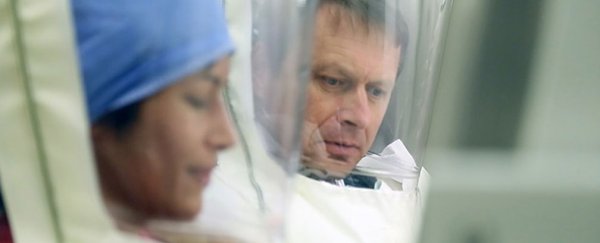One of the toughest challenges in fighting Ebola outbreaks is getting teams of trained medical professionals to where they're needed most to help combat the spread of the virus.
But new research into the world's first inhalable Ebola vaccine may lay the foundations for a quicker, less costly, and potentially risk-free method of delivering Ebola immunisations to those who need them.
Researchers from the University of Texas Medical Branch at Galveston and the US National Institutes of Health have successfully developed an aerosolised Ebola vaccine that can prevent rhesus macaque monkeys that have been injected with a fatal dose of the virus from succumbing to the disease.
"A needle-free, inhalable vaccine against Ebola presents certain advantages," said Michelle Meyer, lead author of the study, in a statement. "Immunisation will not require trained medical personnel."
In a controlled experiment, the researchers delivered a fatal dose of Ebola to 12 monkeys. Four of the monkeys had previously received a single dose of the researchers' inhalable vaccine, while another four received two doses. Of the remaining four monkeys, two had received immunisations in conventional liquid form, while the final two were unprotected.
Ultimately the two unprotected monkeys developed the infection and were euthanised, but all the vaccinated animals showed no signs of the disease at the completion of the study, indicating that even a single dose of the aerosol vaccine can offer effective protection against Ebola for non-human primates.
"This study demonstrates successful aerosol vaccination against a viral hemorrhagic fever for the first time," said Alex Bukreyev, senior author of the research, which is published in The Journal of Clinical Investigation. "A single-dose aerosol vaccine would enable both prevention and containment of Ebola infections, in a natural outbreak setting where healthcare infrastructure is lacking or during bioterrorism and biological warfare scenarios."
While the inhalable vaccine has so far only been tested on monkeys, it's a promising start to research that could eventually help combat the spread of the disease in humans. Since the aerosol vaccine can be administered without the assistance of medical staff, it could help ease the huge costs and complexity of safely deploying medical specialists and aid workers to Ebola hotspots, and allow them to get immunisations to vulnerable communities faster and more easily.
"The discussion in the field right now is if [the West African] Ebola outbreak will be some kind of game changer for vaccine development, or will it only be one more scare that will be forgotten," said Igor Lukashevich, a virologist not involved with the research, in an interview with Nicholas St. Fleur of The New York Times. "This aerosolised form of the vaccine is really what the field needs right now."
